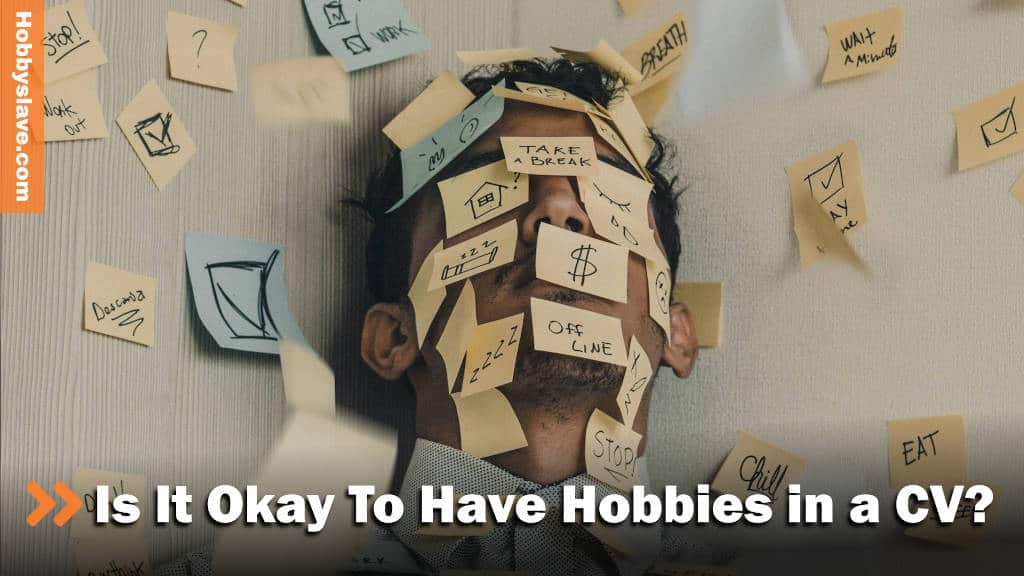Should You Include Hobbies in Your Resume?

There are different opinions on whether you should include hobbies in your resume or not. Some argue that hobbies do not add value to your CV and are better kept out. Others say that hobbies can give you a leg up over your competitors. Who is right?
As with most things, the truth is a bit more nuanced.
In this article, I will explain:
- Why it is a great idea to include hobbies in your resume.
- Examples of great hobbies you can include in your resume.
- When you should include hobbies in your resume.
- The do’s and don’ts of including hobbies in your resume.
- How to include hobbies in your resume.
Let’s dive into the article.
1. Should You Include Hobbies in Your Resume?
For most people, the answer is yes, you should include hobbies in your resume.
If done well, hobbies can be a great asset in helping you to get an interview and even get hired for the job.
Here are a few benefits of including hobbies in your CV.
#1. They help the interviewers to know you better.
An interview is much like a date. The recruiters want to know whether you are a good fit for the organization or the company. Your hobbies will give them an insight into your interests, values, and traits.
#2. They help you to stand out
Interviewers have to sift through hundreds of CVs. If you have unique hobbies, these can help you stand out from the rest. This is especially true if your unique hobby gives you skills that would be beneficial to the company.
#3. They showcase your strengths and skills
Hobbies help you to build skills and strengths that could be useful to your potential employer.
Although you may not have a formal certificate to prove that you have acquired a skill, if you can show several projects that you have completed successfully (e.g. creating a website or app), you will increase your chances of getting hired.
#4. They show that you are good at learning skills
If you have mastered several skill-based hobbies (such as drawing, coding, or guitar), this can signal to the selection panel that:
- You are good at learning new skills (Bonus points if the skill is difficult).
- You have the self-discipline to go through the learning process.
This is important because you will have to quickly learn new skills in your job.
#5. They can help you to connect with an interviewer
If you are lucky to find someone in the selection panel that has similar hobbies to you, this can help you to build a connection.
On the flip side, you might find someone who dislikes your hobby, so it is best to avoid polarizing hobbies unless you enjoy rolling the dice.
#6. They are great ice-breakers
If you have an interesting hobby, the interviewer can ask you to talk a bit about it to help you be more comfortable and settle into the interview. The ice-breaker is an opportunity to display your passion for the hobby, so choose something you know well.
2. What Are Examples of Good Hobbies to Include in Your Resume?
Which kind of hobbies should you include in your CV? It is important to be strategic about which hobbies you include. There are two main things you should consider:
- Include hobbies that showcase particular skills, strengths, or positive traits that could be of interest to the employer.
- Avoid hobbies that are irrelevant to the position or add no value to your application.

Some examples of hobbies that you should consider including in your CV include:
- Hobbies that show you are a good team player such as participating in team sports or playing in a band.
- Hobbies that demonstrate your leadership abilities such as teaching or coaching.
- Hobbies that show your ability to fit in a multicultural environment such as speaking a foreign language or traveling.
- Hobbies that show your ability to solve problems logically such as chess.
- Hobbies that demonstrate your technical abilities such as coding or video editing.
- Hobbies that show your creativity and how it can be used practically, for example, blogging, graphic design, or web design.
- Hobbies that demonstrate your communication skills such as public speaking and writing.
Further reading: If you want a detailed analysis of the best hobbies to include in a CV, check the article 12 Best Hobbies for Your Resume (And Why You Should Have Them)
3. When Should You Add Hobbies to Your Resume?
If you have a lot of work experience in your field, then hobbies may not add much value to your application.
You are better off focusing on your experience and the value you can bring to the company. This is especially true if you are applying for senior positions.
You should add hobbies to your resume if:
#1. You are a fresher
If you are a student that has recently graduated, no one expects you to have a lot of experience. However, you can have an advantage over other freshers if you list hobbies that showcase skills that may be of interest to your potential employer.
For some employers, what matters is whether you can accomplish the task and not your certificates.
#2. You are changing careers
If you are changing careers, you face the same challenges that freshers face- the lack of experience in the new career.
Hobbies can help to demonstrate that you have skills or interests that you can leverage in your new career. This, together with skills and strengths that you carry over from your old career can help to tilt the scales in your favor.
#3. You have employment gaps in your CV.
If you were out of the job market for a long time, you want to avoid the impression that you were idle during that entire time.
Useful hobbies can help to fill in those gaps. For example, you could say that you took a year off to learn how to program.
#4. There is a lot of competition for your post
If many people are applying for a particular job, you need something to make you stand out from the rest. If you have unique and relevant hobbies that you can tie to the requirements of the job, this can be enough to get you an interview.
#5. You have researched the company culture
Some companies are quirky and want to employ out-of-the-box thinkers.
If your prospective company values particular traits, activities, and cultures, then you can match your hobbies to them.
4. What If You Don’t Have Hobbies?
What do you say in an interview if you have no hobbies?
For starters, don’t lie because your lies could catch up with you. For example, if you lie that you can speak Spanish, your interviewer could be a Spanish speaker.
You want to avoid listing down things that you have no clue about.
So what can you do?
- Keep things vague. You can omit the hobbies section and if you are asked about it in an interview, then you can name some generic hobbies like listening to music, walking, or reading.
- Turn a skill into a hobby. If there is something that you regularly do and are fairly good at (for example, cooking) you can mention it as a hobby if pressed at an interview.
- Challenge yourself to learn a hobby. There are so many useful and positive hobbies that you pick up. Chose the ones that will impact several areas of your life.
If you are struggling to come up with a hobby or an interest that you may enjoy, the following articles will help you out.
5. The Don’ts of Adding Hobbies in Your Resume
Adding hobbies to your CV can come with some significant pitfalls that you need to consider before writing your resume.
Generally, you want to avoid anything that could jeopardize your chances of getting the job.
Here are the main things that you need to avoid when writing your resume.
#1. Avoid controversial hobbies
Controversial hobbies such as guns, marijuana, or porn can set off red flags. The fact that you are so open about them in your CV shows that you will be open about them at work as well.
#2. Avoid polarizing hobbies
Avoid listing hobbies that could have a polarizing effect such as religion or politics. People tend to have strong views on this and they will mostly work to your disadvantage unless you are very sure of the company’s values.
#3. Avoid anything that could be seen as discriminatory
Many companies these days have rules that discourage discrimination based on race, gender, or sexual orientation. Avoid listing any interests, affiliations, or content that could be viewed as supporting discriminatory practices (even as a joke).
For example, if you have a social media account, YouTube channel, or blog, ensure that the content does not have anything that could be viewed as discriminatory especially if you are going to list them in your CV.
#4. Avoid listing dangerous hobbies
If you enjoy extreme and dangerous hobbies such as sky diving, BASE jumping, and motorcycle racing, you should consider omitting them from your CV.

They show that you could get injured at any time which will translate into lost work hours and your company has to go through the inconvenience of looking for someone else to fill in.
They also show that you have a personality that enjoys unnecessary risk. Most companies are generally risk-averse and this can work to your disadvantage.
#5. Avoid common or mundane hobbies
Hobbies such as listening to music, watching movies, and socializing with friends are hobbies that will not help you stand out. If you must include them, you must spice them up to make them more interesting (see more in the next section).
#6. Avoid hobbies that will make you get stereotyped negatively
Some activities are generally associated with bad values or antisocial behavior. Let’s say, for example, that you belong to a biker gang and you like guns and tattoos.
You might be the nicest guy but you probably won’t get to the interview stage because of the perception that people have of tattooed bikers that love guns.
#7. Don’t be too weird
You need to be unique without being weird. You don’t want to stand out for the wrong reasons.
How do you tell the difference between unique and weird hobbies? Weird hobbies generally come off as creepy, strange, or gross. Unique hobbies are uncommon and interesting.
Here are examples of unique versus weird.
- Weird Hobbies: Dumpster diving, eyeball tattoos, and enjoying roadkill cuisine.
- Unique Hobbies: Needle felting, bonsai, and building saltwater aquariums.
#8. Avoid hobbies that make you look lazy
While we all need some rest, if all your hobbies seem to indicate that you are not very active, this may work against you.
Someone may conclude that you are lazy if all your hobbies are low-effort and low-energy, for example sleeping, daydreaming, watching TV, or browsing social media.
See my articles on The Best Hobbies for Resume and Productive Hobbies for ideas on hobbies you can include in a CV.
6. The Do’s of Adding Hobbies in Your Resume
Here are some good practices that you should take into account when including hobbies in your CV.
#1. Match your hobbies to the role or position you are applying for
Your hobbies should add value to the role you are applying for. For example, if you are a teacher you want to include hobbies like coaching, mentoring, or coding as these are in demand in many schools (see The Best Hobbies for Teacher’s Resume for more).
#2. Ensure that your hobbies are in line with the company’s values
Research the company to ensure that you understand the values and culture of the company. If your hobbies display values that go against the company’s culture, then will have a hard time getting an interview.
For example, if you love guns but the company you are applying to has a strong anti-gun culture, then your application is dead on arrival.
#3. Include hobbies that demonstrate your strengths and skills
You should align your hobbies and interests with those skills and traits that are desired by companies and organizations. Some of the skills that are in high demand in companies include:
- Ability to work well with others
- Leadership
- Problem-solving
- Creativity
#4. Be specific
Be specific when describing your hobbies, especially if you have mundane hobbies like reading, writing, or watching movies.
Hobbies that are too generic are boring and won’t add much value to your application.
Try to spice up your mundane hobby by tailoring it to the job that you are applying for and being more specific about it.
For example, if you are applying for a stock broker’s position, instead of writing down ‘reading’ as a hobby, you could say that you enjoy reading about black swan events in finance or you can say that your favorite author is Nassim Taleb.
This gives context to your hobby and keeps it in line with the position you are applying for.
7. How Many Hobbies Should You Include In Your Resume?
Recruiters don’t have a lot of time to go through your resume. So you need to ensure that your most important hobbies stand out.
You can include 2-4 hobbies depending on the following factors.
- Your level of experience. If you have no experience suitable for the job, then you can have more hobbies and give more details about them.
- The position you are applying for. If you are applying for senior positions, then you can have fewer or no hobbies listed.
- Your prospective company. If the company seems hip or quirky, then you can be less stuck up about your hobbies.
However, regardless of what position you are applying for, ensure that take into account the do’s and don’ts that I have discussed above.
8. How Should You Include Hobbies in Your Resume? (Examples)
When writing down your hobbies, you want to be specific without being wordy. You should arouse curiosity so that a recruiter will not gloss over this section. Avoid being boring.
Here are some great examples of how to do it.
- Sports: I have competed in 5 marathons (and was among the top 200 runners).
- Traveling: I have back-packed in 5 countries (and 3 continents).
- Languages: I can speak fluently in English, French, and Spanish.
- Magic: I have done magic for the last 5 years and I specialize in card tricks.
9. Where Should You Put the Hobbies Section?
This depends on what weight you want to give to the hobbies section.
Remember, recruiters will probably spend just a few minutes on your CV and they will scan through it as quickly as possible.
If you have previous employment and great educational qualifications, you should start with these and have hobbies towards the bottom. You want the hobbies to be the icing on the cake and not the cake.
If you have little or no experience, then you want this section to be closer to the top of your CV. You have nothing to talk about anyway and you have nothing to lose. Concentrate on showing how your hobbies and interests make you the best fit for the job.
Wrapping Up
You want to include hobbies in your resume without jeopardizing your chances of getting the job.
Hopefully, you have found some tips and strategies that you can use to write a great hobbies section in your CV.
What to read next
If you want a detailed analysis of which hobbies are the best for your CV, check out my article The Best Hobbies for a Resume. If you are a teacher, check out The Best Hobbies for Teacher Resume.
If you are struggling to come up with a hobby or an interest that you may enjoy, the following articles will help you out.
